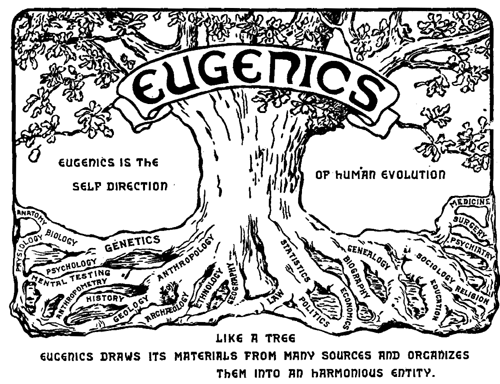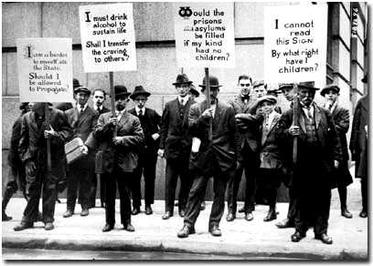Eugenics is the bio-social movement which advocates practices to improve the genetic composition of a population, usually a human population.[2][3]
It is a social philosophy advocating the improvement of human hereditary traits through the promotion of higher reproduction of more desired people and traits, and reduced reproduction of less desired people and traits.[4]

Eugenics, as a modern concept, was originally developed by Francis Galton. Galton had read his cousin Charles Darwin's theory of evolution, which sought to explain the development of plant and animal species, and desired to apply it to humans. In 1883, one year after Darwin's death, Galton gave his research a name, Eugenics.[5]
Throughout its recent history, eugenics remains a controversial concept.[6] As a social movement, eugenics reached its greatest popularity in the early decades of the 20th century.
At this point in time, eugenics was practiced around the world and was promoted by governments, and influential individuals and institutions. Many countries enacted[citation needed] various eugenics policies and programs, including: genetic screening, birth control, promoting differential birth rates, marriage restrictions, segregation (both racial segregation and segregation of the mentally ill from the rest of the population), compulsory sterilization, forced abortions or forced pregnancies and genocide. Most of these policies were later regarded as coercive and/or restrictive, and now few jurisdictions implement policies that are explicitly labeled as eugenic or unequivocally eugenic in substance.
See also[edit]
Aktion T4
Biological determinism
Dysgenics
Eugenics in the United States
Sperm bank
Ova bank
Euthenics
Genetic determinism
Genism
History of the race and intelligence controversy
Race and genetics#Ancestral populations
International Federation of Eugenics Organizations
Kaiser Wilhelm Institute of Anthropology, Human Heredity, and Eugenics
Liberal eugenics
Life unworthy of life
Oneida stirpiculture
Racial hygiene
Social Darwinism
Culling
Artificial selection
Eugenics manifesto
Individuals:
Karl Binding
Alexis Carrel
John Glad
Hans Friedrich Karl Günther
Alfred Hoche
Lee Kuan Yew
John M. MacEachran
Bénédict Morel
Alfred Ploetz
Ernst Rüdin
Margaret Sanger
Katherine M. H. Blackford
Georges Vacher de Lapouge
Organisations:
Alberta Eugenics Board
Repository for Germinal Choice, a high IQ sperm bank.
Eugenics - Wikipedia, the free encyclopedia
......
letters, and articles from the American Eugenics movement of the last ...
Future Generations
www.eugenics.net/
Promoting a cleaner and healthier world by improving the human gene pool. Voluntary humanitary eugenics can provide our children a legacy of greater ...
A Science Odyssey: People and Discoveries: Eugenics movement ...
www.pbs.org/wgbh/aso/databank/entries/dh23eu.html
The term eugenics comes from the Greek roots for "good" and "generation" or "origin" and was first used to refer to the "science" of heredity and good breeding in ...
Eugenics | Define Eugenics at Dictionary.com
dictionary.reference.com/browse/eugenics
the study of or belief in the possibility of improving the qualities of the human species or a human population, especially by such means as discouraging ...
Vermont Eugenics: A Documentary History
www.uvm.edu/~eugenics/
Eugenics--the quest for human betterment through selective breeding--is a largely forgotten chapter in American history. This site offers the story of how ...
Searches related to eugenics
eugenics today
history of eugenics
eugenics movement
eugenics definition
eugenics society
social darwinism
bill gates eugenics
social darwinism and eugenics
People related to eugenics
Francis Galton
... works and for his anthropometric studies. He was a pioneer in eugenics, coining the term itself and the phrase "nature versus nurture ...
Margaret Sanger
Sanger is a frequent target of criticism by opponents of birth control and has also been criticized for supporting eugenics, but remains ...
Charles Davenport
He was one of the leaders of the American eugenics movement, which was directly involved in the sterilization of around 60000 "unfit ...
It is a social philosophy advocating the improvement of human hereditary traits through the promotion of higher reproduction of more desired people and traits, and reduced reproduction of less desired people and traits.[4]

Eugenics, as a modern concept, was originally developed by Francis Galton. Galton had read his cousin Charles Darwin's theory of evolution, which sought to explain the development of plant and animal species, and desired to apply it to humans. In 1883, one year after Darwin's death, Galton gave his research a name, Eugenics.[5]
Throughout its recent history, eugenics remains a controversial concept.[6] As a social movement, eugenics reached its greatest popularity in the early decades of the 20th century.
At this point in time, eugenics was practiced around the world and was promoted by governments, and influential individuals and institutions. Many countries enacted[citation needed] various eugenics policies and programs, including: genetic screening, birth control, promoting differential birth rates, marriage restrictions, segregation (both racial segregation and segregation of the mentally ill from the rest of the population), compulsory sterilization, forced abortions or forced pregnancies and genocide. Most of these policies were later regarded as coercive and/or restrictive, and now few jurisdictions implement policies that are explicitly labeled as eugenic or unequivocally eugenic in substance.
See also[edit]
Aktion T4
Biological determinism
Dysgenics
Eugenics in the United States
Sperm bank
Ova bank
Euthenics
Genetic determinism
Genism
History of the race and intelligence controversy
Race and genetics#Ancestral populations
International Federation of Eugenics Organizations
Kaiser Wilhelm Institute of Anthropology, Human Heredity, and Eugenics
Liberal eugenics
Life unworthy of life
Oneida stirpiculture
Racial hygiene
Social Darwinism
Culling
Artificial selection
Eugenics manifesto
Individuals:
Karl Binding
Alexis Carrel
John Glad
Hans Friedrich Karl Günther
Alfred Hoche
Lee Kuan Yew
John M. MacEachran
Bénédict Morel
Alfred Ploetz
Ernst Rüdin
Margaret Sanger
Katherine M. H. Blackford
Georges Vacher de Lapouge
Organisations:
Alberta Eugenics Board
Repository for Germinal Choice, a high IQ sperm bank.
Eugenics - Wikipedia, the free encyclopedia
......
letters, and articles from the American Eugenics movement of the last ...
Future Generations
www.eugenics.net/
Promoting a cleaner and healthier world by improving the human gene pool. Voluntary humanitary eugenics can provide our children a legacy of greater ...
A Science Odyssey: People and Discoveries: Eugenics movement ...
www.pbs.org/wgbh/aso/databank/entries/dh23eu.html
The term eugenics comes from the Greek roots for "good" and "generation" or "origin" and was first used to refer to the "science" of heredity and good breeding in ...
Eugenics | Define Eugenics at Dictionary.com
dictionary.reference.com/browse/eugenics
the study of or belief in the possibility of improving the qualities of the human species or a human population, especially by such means as discouraging ...
Vermont Eugenics: A Documentary History
www.uvm.edu/~eugenics/
Eugenics--the quest for human betterment through selective breeding--is a largely forgotten chapter in American history. This site offers the story of how ...
Searches related to eugenics
eugenics today
history of eugenics
eugenics movement
eugenics definition
eugenics society
social darwinism
bill gates eugenics
social darwinism and eugenics
People related to eugenics
Francis Galton
... works and for his anthropometric studies. He was a pioneer in eugenics, coining the term itself and the phrase "nature versus nurture ...
Margaret Sanger
Sanger is a frequent target of criticism by opponents of birth control and has also been criticized for supporting eugenics, but remains ...
Charles Davenport
He was one of the leaders of the American eugenics movement, which was directly involved in the sterilization of around 60000 "unfit ...





